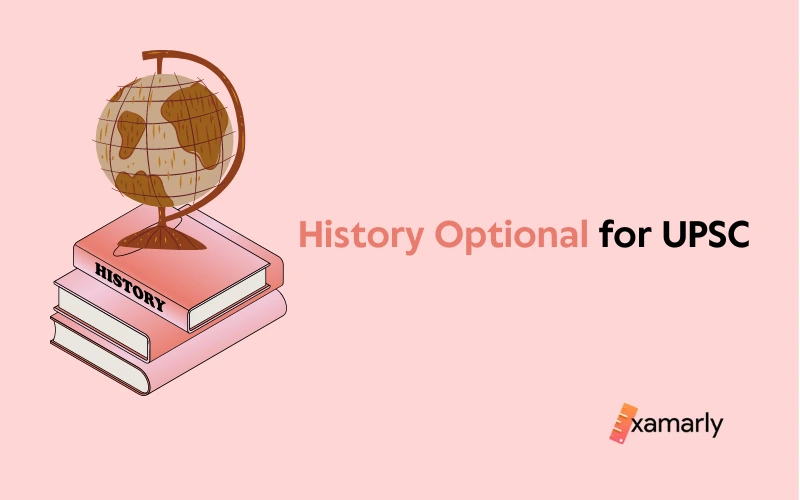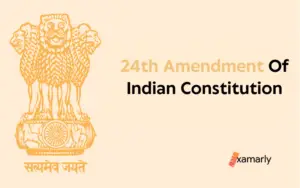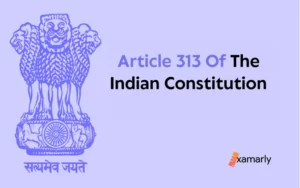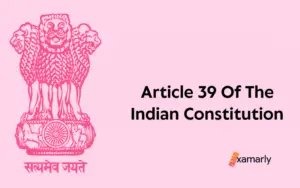For the aspirants of the IAS mains exams, History optional for UPSC seems to be a popular choice. It is one of the most sought-after subjects for an optional paper. It holds immense importance from the point of view of the UPSC exam preparation strategy.
Candidates are judged for their knowledge of History in both the Prelims and Mains General Studies paper of the IAS exam. It has the potential to award the candidate with a good score.
Also, it is the constant alternative among the toppers of the UPSC Civil Services Exam. The question lingering in a candidate’s mind would be whether choosing History optional for UPSC is a wise decision or not.
Read on to educate yourself about all the aspects related to this subject and decide for yourself through this blog.
Check out the UPSC syllabus here.
- Comparison with other Optional papers
- History Optional for UPSC: Advantages
- 1. Mastering the subject from the basics
- 2. Importance of academic background
- 3. Time duration required for preparation
- 4. Overlapping syllabus with GS
- 5. Help with Essay paper
- 6. Help in the interview
- History Optional for UPSC: Disadvantages
- Strategy for preparation of History Optional for UPSC: 5 Tips
- UPSC CSE History Optional toppers
- Data available
- History Optional syllabus
- Books for History Optional for UPSC
- Conclusion
- FAQs
Comparison with other Optional papers
To start with, let us try to compare the History optional with other optional papers.
1. General Studies paper I
The History optional for UPSC has certain similarities as well as differences from other optional papers. Some topics in History are common to the General Studies paper I.
The candidate may find overlapping topics such as Ancient, Medieval, and Modern Indian history, and culture in both papers.
Hence, portions of GS paper are covered while studying History, thereby, saving time.
2. Geography Optional paper
Another optional subject that History optional is comparable to is Geography optional paper.
History is known to have a vast syllabus while Geography has comparatively less syllabus to cover. The scoring potential of History is less than that of Geography as the latter is considered to be a scoring subject.
Moreover, the maps in History are not as easy as the maps in Geography. Good writing skills are required for answering the History optional paper.
There are a few similarities between these two papers too. The difficulty level is somewhat the same and dependent on the interest of the candidate. There is no compulsion of any background for choosing either of the subjects.
Also, both papers have a success rate exceeding 5%.
History Optional for UPSC: Advantages
Opting for History optional for UPSC has numerous advantages. For aspirants with excellent retention skills, History can be studied in the form of a story with events occurring in chronological order. There is no use of exhaustive formulas and intricate concepts.
This paper does not require keeping a tab on current events as it is a static subject.
In addition to that, there is a multitude of resources in the form of books and study materials to complement the preparation strategy.
History is an all-encompassing subject which makes it a very interesting read. It includes topics of economy, socio-politics, etc. within its ambit. It also helps to inculcate good reading habits in a candidate.
1. Mastering the subject from the basics
Even though the syllabus is vast and requires excellent memorization skills, having a strong foundation can lead a candidate to great heights. Therefore, it is recommended to begin the preparation by mastering the subject from the basics.
2. Importance of academic background
Candidates with prior knowledge of the subject as part of their graduation or post-graduation curriculum will be able to tackle the subject smoothly.
3. Time duration required for preparation
It is a common belief that History has a vast syllabus. This discourages a lot of aspirants from going ahead with this optional subject.
However, the truth is, the syllabus of this subject can be covered within 5 months. Provided that one has a proper preparation strategy put in place.
4. Overlapping syllabus with GS
The Prelims as well as the Mains paper of General Studies have a syllabus that overlaps with certain portions from History.
Hence, it reduces the time required for covering the syllabus of both papers. Writing historical perspectives can add weight to the answers of the GS paper.
5. Help with Essay paper
Studying History gives an in-depth insight into current affairs. In a way, this helps with the essay paper. History holds the reason for the way things are in the present day. Knowledge of the past helps in better comprehension of the present.
Therefore, it aids in preparing for the future keeping in mind the things learned, mistakes made, and the experience gained.
Related Reading: 5 Essential Steps: How to Write an Essay in UPSC Mains
6. Help in the interview
Awareness of the optional subject helps to answer basic questions related to it. This boosts the confidence level of the candidate and creates a favourable impression in front of the interviewers.
History Optional for UPSC: Disadvantages
Just like the two sides of a coin, there are disadvantages to this paper as well. They have been mentioned in the following points.
- History Optional deals with a massive syllabus that needs to be studied as a whole.
- The paper may come off as monotonous for candidates with no interest in the subject. They may face difficulty in studying it.
- Good answer writing skills are a must to score well in this subject.
- The paper is not as scoring as other papers such as Science or Math.
- History requires excellent retention capacity to memorize the dates and names of events and people.
- Subjects such as Science leave no space for ambiguity. However, in History, things may be open to interpretation. A candidate’s marks might not match their expectations in some cases.
- Subjects like Geography or Public Administration might come in handy in comparison to History. Candidates may benefit from the former subjects when becoming administrators in the future.
Strategy for preparation of History Optional for UPSC: 5 Tips
Preparing for History optional for UPSC requires a thorough understanding of the subject matter and the ability to analyze and interpret historical events. Here are five strategies to help you prepare effectively:
- Understand the syllabus and exam pattern: Go through the UPSC syllabus for History optional and understand the exam pattern. Know the weightage of marks for each topic and understand the level of difficulty of the exam. This will help you plan your preparation strategy accordingly.
- Read standard textbooks and reference books: The first step in preparing for any optional subject in UPSC is to read the standard textbooks. For History, refer to NCERT textbooks from classes 6 to 12, and then move on to reference books like Bipin Chandra’s “India’s Struggle for Independence,” and RS Sharma’s “Ancient India.”
- Make notes and mind maps: While reading, make notes on important concepts, events, and dates. You can also create mind maps to help you understand the interconnectivity of different historical events and concepts. This will help you remember important information during the exam.
- Practice answer writing: Practice answer writing regularly, especially for previous year UPSC history optional papers. This will help you understand the pattern of the questions and the amount of information you need to write answers in the given time. It will also help you develop a good writing style and learn how to structure your answers.
- Join a test series: Joining a good test series for History optional can help you evaluate your preparation level and identify areas where you need to improve. It will also help you manage your time better and increase your speed and accuracy while attempting the exam.
Remember, preparing for History optional requires patience, discipline, consistent effort and staying motivated. Keep revising your notes and stay updated with current affairs related to historical events.
UPSC CSE History Optional toppers
The following candidates excelled in their respective years of appearing in the UPSC CSE with flying colours. All of these candidates had a thing in common. They had opted for History as their optional subject.
| Name | Year | Rank |
| Aparajita | 2017 | 40 |
| Ishwar Kumar Kandoo | 2017 | 187 |
| Gazal Bharadwaj | 2015 | 40 |
| Agam Jain | 2015 | 133 |
| Surabhi Malik | 2011 | 51 |
Data available
As per available data, 150 out of the 1761 candidates with History as their optional subject cracked the IAS mains exam. This data is from the 2015 UPSC civil services exam. This renders the subject a success rate of 8.5%. This promoted the belief that opting for History reaped promising results.
| Year | No. of Candidates Appeared | No. of Candidates Recommended | Success Rate (%) |
| 2012 | 2090 | 174 | 8.3 |
| 2013 | 1303 | 100 | 7.7 |
| 2014 | 1560 | 102 | 6.5 |
| 2015 | 1821 | 102 | 5.6 |
| 2017 | 1074 | 59 | 5.5 |
Looking at the data mentioned above, it can be calculated that the average count of candidates who go for the History Optional subject ranges between 1500 and 2000. The reason could be the overlapping of its syllabus with the GS paper.
Also Read: A Complete Guide on How to Study History for UPSC CSE
History Optional syllabus
Candidates have to appear for two papers for the History optional subject exam in UPSC Mains. The History optional subject comprises 2 papers, namely- Paper I and Paper II. The weightage of each of these papers is 250 marks. So, the total of each paper equates to 500 marks.
Read this blog on the History Optional syllabus for UPSC to take a detailed look at the syllabus of the History Optional paper.
Books for History Optional for UPSC
The list of following books may be used as the best sources of reference for the preparation of the History Optional paper.
- NCERT History Books (Class IX to XII)
- NIOS/IGNOU Notes
- History of Modern India by Bipan Chandra
- India’s Struggle for Independence by Bipan Chandra
- India’s Ancient Past by R.S. Sharma
- The Wonder that was India by Al Basham
- Ashoka and the Decline of the Mauryas by Romila Thapar
- Medieval India: From Sultanate to Mughals – 1 by Satish Chandra
- Medieval India: From Sultanate to Mughals – 2 by Satish Chandra
- History of Medieval India: From 647 A.D. to the Mughal Conquest by Satish Chandra
- History of the World by Arjun Dev
- Mastering Modern World History by Norman Lowe
- Indian Art and Culture by Nitin Singhania
- Historical Atlas of India
- A History of Ancient and Early Medieval India: From the Stone Age to the 12th Century by Upinder Singh
- From Plassey to Partition and After a History of Modern India by Sekhar Bandyopadhyay
- A Comprehensive History of Medieval India: From Twelfth to the Mid-Eighteenth Century by Farooqui Salma Ahmed
- Contemporary India: Economy, Society, Politics by Neera Chandhoke
- A History of Modern World by Jain and Mathur
Conclusion
For an IAS aspirant, it would be a smart move to include History as an optional subject. Labelling the subject as a good or bad choice depends on a person’s perception. It is highly debatable.
The candidate must weigh both the pros as well as cons to choose an optional paper.
The point to be noted here is that the preference for a subject or otherwise is solely based on the aspirant’s aptitude and interest in the given subject.
FAQs
Who scored the highest in UPSC History Optional in the year 2017?
In 2017, Ishwar Kumar Kandoo secured the maximum marks in the History Optional paper. He scored 316 marks out of 500. He achieved 160 marks on paper I. In paper II, he scored 156 marks.
What was the success rate for the History Optional paper in 2017?
The rate of success for the History Optional paper in the year 2017 was 5.5.
How can one prepare for the History Optional paper?
To prepare for the IAS History Optional, the most recommended suggestion is to stick to some selected books for reference purposes. Reference books provide detailed information about events of past times.
The ideal choice for learning the basics of History is NCERT. It follows Indian history right from ancient times to post-independence India in the sequence of their occurrence. You could refer to video lectures as well.
Is History a good optional for UPSC?
Yes, History is a popular optional subject for the UPSC exam as it is a static subject and closely linked to current affairs, helping candidates to develop a comprehensive understanding of various topics.
However, it requires a significant amount of memorization of facts and events, along with strong analytical and critical thinking skills.
How much can I score in History as optional subject in UPSC?
It is difficult to predict the exact score that one can achieve in History as an optional subject in the UPSC exam as it depends on various factors such as the candidate’s preparation, understanding of the subject, analytical and critical thinking skills, and performance on the day of the exam.
However, with thorough preparation and a good strategy, it is possible to score well in History.






